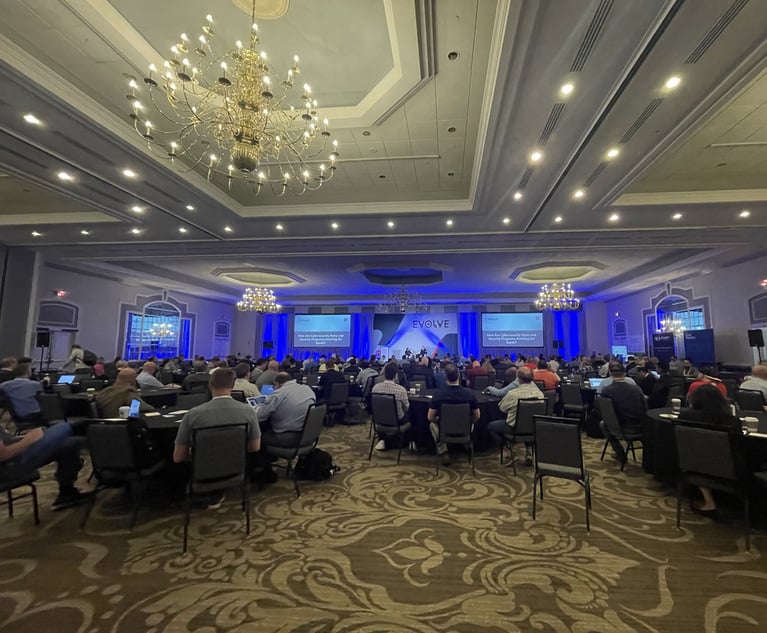The Great Enabler
|Prudential Financials new CIO believes much of the next decadewill be spent leveraging the Internet to provide changingcapabilities that meet customers shifting expectations.
|BY ROBERT REGIS HYLE
|Barbara Koster brought some valuable experience to her promotionto chief information officer at Prudential Financial last December.She joined Prudential Financial in 1995 as vice president, policyadministration and management information systems. Two years latershe was named CIO of Prudentials individual financial services andheld that position until moving up to her current role just threemonths ago.
|Prior to joining Prudential, she was with Chase Manhattan Bankin a variety of technology-related positions. She is a graduate ofSt. Francis College in Brooklyn, N.Y., with degrees in businessadministration, computer technology, and accounting. She has been afeatured speaker at a variety of industry forums and is active inindustry organizations, including ACORD, where she sits on theboard of directors.
|As CIO of Prudentials individual financial services, she wasresponsible for initiating LaunchPad, the groundbreaking programthat put a laptop and a suite of software into the hands of thecompanys entire field force. With the third rollout of laptops forits agents now under way, Koster shares what LaunchPad has done forthe carriers agents and their customers and comments on several ofthe other important aspects of her new job.
|Tech Decisions: In an interview you did severalyears ago, you said e-commerce would be one area of insurancetechnology that would see the most advances over the next decade.Do you still feel that way?
|Koster: Yes, I do. I think our client base is moving more andmore into integrating the use of technology into their lives. Idont believe [the Internet] is helping from a standpoint of sellingproducts. But from a standpoint of serving our clients, I think itstill is the wave of the future, whether it is making informationavailable about their policies, allowing customers to change theirinformation, or allowing them to pay their monthly bills. All ofthose areas still are excellent uses of the Web and will facilitateus giving great customer service.
|Tech Decisions: Is e-commerce growing at therate you expected? Slower? Faster?
|Koster: I think its moving as I expected. Howquickly the customers shift is what drives how quickly we shift.Right now we have multiple capabilities. We have telephone centersclients can call into, we have Web access all clients can have ifthey so desire, and we still have the good old U.S. mail. We mayimage it and put it through a workflow, but if a client sends us aletter, we respond. We are working the way the clients want us towork.
|Tech Decisions: Tell us about LaunchPad,Prudentials laptop program for its agents. How successful a programhas this been for the company? Is wireless technology going to be apart of the program?
|Koster: LaunchPad has been very successful.Were coming up on our third rollout of laptops. This go-around willnot be using wireless technology, not because it isnt available,but we dont have broad enough access across the country. Some ofour agents are in remote areas, and not everyone is in ametropolitan area, so wireless still has a little way to go to beavailable to everyone. At this point, the agents are getting newlaptops, but not wireless. I do think wireless still is very muchin our future as it becomes a more stable environment to workin.
|Tech Decisions: What other ways is Pru-dentialusing technology to help keep its agents ahead of thecompetition?
|Koster: Were making the Internet more readilyavailable to our agents for price quoting and information gatheringas they prepare to go to their clients with either new sales,reviews of current portfolios, or reaching out to a new client.Weve made more information available to agents on their laptops soeverything is right there at their fingertips when they are talkingwith clients. Theres information about products, pricing,quotingits all there for them.
Tech Decisions: Youve been quoted as saying the people you workwith are the most exciting part of your job. As the number ofpeople working under your direction continues to grow, is thatstill the case?
Koster: I still think our people are the mostimportant part of our business, whether theyre in technology,actuarial, finance, or HR. It is the people who make a companysuccessfulhelping them understand how each and every one of theirjobs is important in the total scheme of delivery for ourcustomers. Our employees always will remain the most importantingredient we have. It is a bit harder to stay in touch witheveryone as you move up the ladder. Thats why I do town-hall-stylemeetings monthly with our staff members to help them understand thedirection of our business and specifically understand how theirtechnology jobs help deliver for the business and for ourcustomers. It is important that we talk to each otherthat we stayin touch. Prudential believes strongly in what our employees think.We do surveys to make sure we understand what they need to do theirjob better and how they feel about what we are doing. Its still themost interesting part of my job and the part I love the most.
|Tech Decisions: What do you look for in puttingan IT team together?
|Koster: I look for diversitydiversity ofthinking, diversity of skill sets. In a technical world, you needpeople who love to design and strategize. You need people who canthink out to the futurelook at technology and project where itmight take you. You need people who work in the todayourimplementation people, project managerswho know how to take thevision an architect might put out there and bring that vision homeby implementing the project or delivering the features or thefunctions for the customer. So you need people who can strategize,people who can implement, and people who can maintain theday-to-day things once you are implementedmake sure the computer isup and running, the PCs are working, the software is available, noerror rate is found, and the bills are paid. We have to find peoplewith the different skill sets each of these jobs require andpackage those skill sets together with folks who like to do whatthey do.
|Tech Decisions: You have said in the pastPrudential is focused on making IT expenses part of the businessprocess rather than spending money for ITs sake. Do you see this asa trend among insurance carriers?
|Koster: Prudential specifically works onprioritizing technology to enable its business need or deliver anew product. The business is very clear about what it needs toaccomplish, and the technology is brought in to enable thatdelivery. Technology also enables the productivity of theorganization by automating features that may have been manualbefore. Prudential is very big on first putting its strategytogether, then defining the types of products that need to bedelivered for the business, and then actually bringing in thetechnology to enable it and make it happen. Most of my counterpartsin insurance do exactly the same thing. The technology is anenabler to the business.
|Tech Decisions: You have been active withstandards groups such as ACORD. Have you been successful inconvincing other insurers of the advantages to be reached throughthe use of standards? What do you say to insurance IT leaders whodont feel the need to comply with industry-specific standards?
|Koster: Since Ive become a part of ACORD, weveincreased the [organizations] membership, and it is clearly due tothe discussions on how standards will help us to deliver thetechnology that will make it easier for our customers to dobusiness with us. If were all defined differently, its hard to workwith vendors because everything be-comes special or proprietary andthe vendors have to try to serve many masters at once. That doesntwork. The vendors also would be faced with managing multipleversions of their products. From the standpoint of how the customerviews standards, at the end of the day we may be differentcompanies delivering different product sets, but the service wedeliver is common and the customer knows the difference if theservice is different. Standards actually help us in delivering tothe customer in a way where we all have a chance of interacting andworking together. The banks figured this out a long time ago. Theyfigured people would have relationships with more than one bank;they would have relationships with more than one brokerage company.So, too, they will have relationships with multiple insurancecarriers. Our ability to share data and interact is important froma customer perspective. The more carriers are working together toput the standards out there so we can define things the same way,it facilitates the vendors to start creating products for us to useso were not developing everything ourselves.
|Tech Decisions: We started this discussion withyou looking at your perspective on where e-commerce has come in thelast few years. As we look ahead from 2004, is e-commerce still thearea you believe will have the most technological advances in therest of this decade?
|Koster: There are not a lot of brand-newtechnologies out there today. In the next 10 years, we are going tosee people leveraging the technologies that are already here. Istill believe the Internet is going to be a big driver for us. Ifyou think about teenagers today who are going into college, theyveused technology from when they were three and four years old, sotheir life is built around technology. They do their homework thatway, they do their purchasing that way, they do all theircommunication that way. So, our ability to start to change the waywe do business to the way this generation will want to work isgoing to be important. In the next five years, they are going to belooking for all this technology, and we better be there, otherwisetheyll go to the companies that have it.
|I still believe the Internet is very much the game. We confusedthe issue by saying we were going to sell things over the Internet.Not all products can be sold over the Internet, but it certainly isa tool of choice in terms of making it easy and quick to getservice. Leveraging the Internet from a productivity point of view,being sensitive to customers time schedules, and recognizing thefact they have little time, I think thats going to be the win inthe end.
Want to continue reading?
Become a Free PropertyCasualty360 Digital Reader
Your access to unlimited PropertyCasualty360 content isn’t changing.
Once you are an ALM digital member, you’ll receive:
- All PropertyCasualty360.com news coverage, best practices, and in-depth analysis.
- Educational webcasts, resources from industry leaders, and informative newsletters.
- Other award-winning websites including BenefitsPRO.com and ThinkAdvisor.com.
Already have an account? Sign In
© 2024 ALM Global, LLC, All Rights Reserved. Request academic re-use from www.copyright.com. All other uses, submit a request to [email protected]. For more information visit Asset & Logo Licensing.








